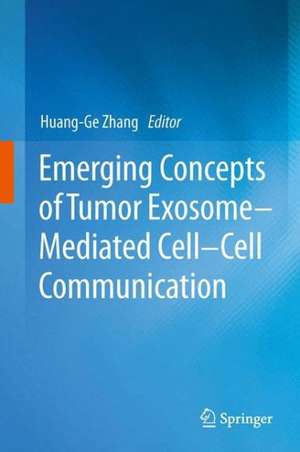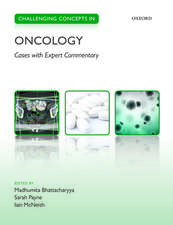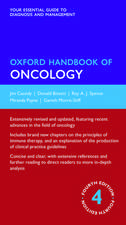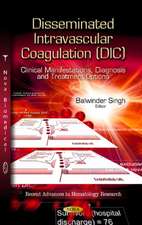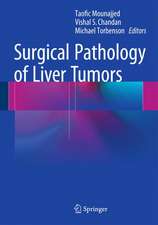Emerging Concepts of Tumor Exosome–Mediated Cell-Cell Communication
Editat de Huang-Ge Zhangen Limba Engleză Paperback – 15 oct 2014
| Toate formatele și edițiile | Preț | Express |
|---|---|---|
| Paperback (1) | 775.16 lei 43-57 zile | |
| Springer – 15 oct 2014 | 775.16 lei 43-57 zile | |
| Hardback (1) | 1100.64 lei 43-57 zile | |
| Springer – 6 sep 2012 | 1100.64 lei 43-57 zile |
Preț: 775.16 lei
Preț vechi: 815.97 lei
-5% Nou
Puncte Express: 1163
Preț estimativ în valută:
148.32€ • 155.28$ • 122.73£
148.32€ • 155.28$ • 122.73£
Carte tipărită la comandă
Livrare economică 07-21 aprilie
Preluare comenzi: 021 569.72.76
Specificații
ISBN-13: 9781489992901
ISBN-10: 1489992901
Pagini: 228
Ilustrații: VIII, 220 p.
Dimensiuni: 155 x 235 x 12 mm
Greutate: 0.33 kg
Ediția:2013
Editura: Springer
Colecția Springer
Locul publicării:New York, NY, United States
ISBN-10: 1489992901
Pagini: 228
Ilustrații: VIII, 220 p.
Dimensiuni: 155 x 235 x 12 mm
Greutate: 0.33 kg
Ediția:2013
Editura: Springer
Colecția Springer
Locul publicării:New York, NY, United States
Public țintă
ResearchCuprins
Preface.- The Cell Biology of Exosomes : Historical and Perspectives.- The role of exosomal shuttle RNA (esRNA) in cell-to-cell.- Exosomal lipids in cell-cell communication.- The Functional Importance Of Tetraspanins In Exosomes.- The effects of exosomes and related vesicles on cancer development, progression, and dissemination.- Circulating Cell-derived Vesicles Mediate Tumor Progression.- Immune modulation of T cells and natural killer cells by tumor-derived exosomes.- The Role Of Tumor Exosomes In Tumorigenicity.- Microenvironmental regulation of metastasis by exosomes.- Microvesicles and their Emerging Role in Cellular Therapies for Organ and Tissue Regeneration.- Index
Textul de pe ultima copertă
Tumor exsome-mediated cell-cell communication has grown increasingly important in cancer research. Recent findings on vesicle-based information transfer by exosomes have changed our view of the tumor microenvironment. Currently, exosomes represent the main extracellular processes implicated in the regulation of multiple physiological processes. Importantly, in cancer, exosomes contribute to the formation of the tumor microenvironment, promoting invasion, angiogenesis, immune regulation and metastasis. Therefore, exosomes could be considered one of the major forces acting locally or systemically to promote the continuous crosstalk between the tumor and its microenvironment, influencing the behavior of different cell types such as stromal, endothelial and bone marrow-derived cells.
Given the ability of exosomes to export unneeded endogenous molecules from cells, these structures hold great potential as anticancer therapeutic agents. This volume gives a comprehensive review on current research in this area and also discuss future prospects as prognostic markers for cancer.
Given the ability of exosomes to export unneeded endogenous molecules from cells, these structures hold great potential as anticancer therapeutic agents. This volume gives a comprehensive review on current research in this area and also discuss future prospects as prognostic markers for cancer.
Caracteristici
Explores recent findings on vesicle-based information transfer by exosomes Provides an overview of exosomes biology and function Discusses the role of exosomal tetraspanins in tumor progression Includes supplementary material: sn.pub/extras
